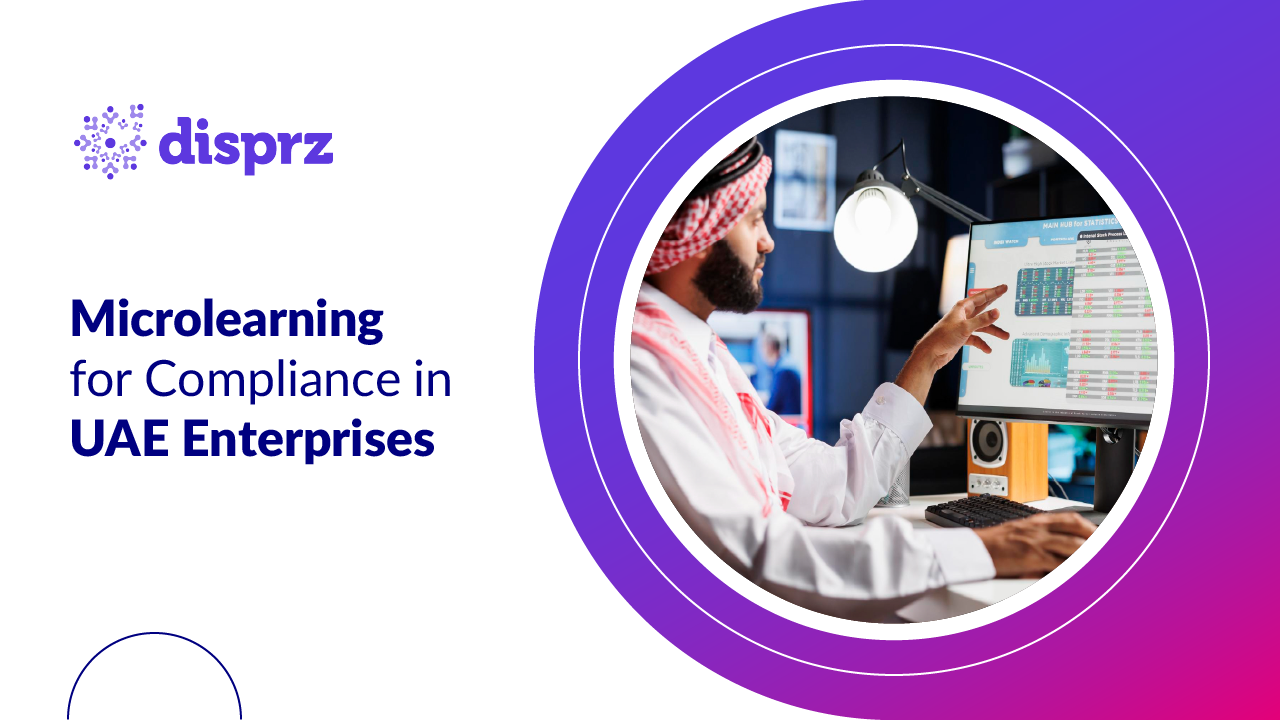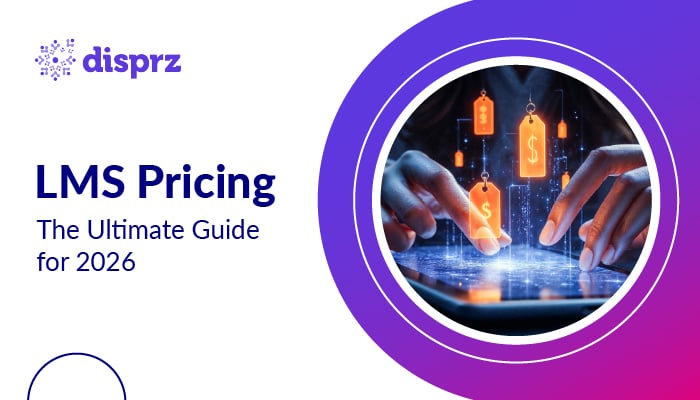The United Arab Emirates (UAE) is home to some of the world’s most highly regulated industries such as banking, healthcare, aviation, and oil & gas. In this environment, compliance is not optional. Non-compliance can result in hefty fines, suspension of licenses, reputational damage, and even operational shutdowns.
For UAE enterprises, compliance is a survival necessity, not just a box-ticking exercise. Whether it’s meeting anti-money laundering (AML) compliance requirements in banking, aviation safety standards, or healthcare certifications, organizations must ensure their employees are consistently trained, certified, and audit-ready.
Unfortunately, traditional compliance training formats often fail. Classroom-based sessions or lengthy e-learning modules are time-consuming, create downtime for employees, and suffer from low knowledge retention. For frontline and distributed teams, attending long training sessions is not always feasible.
This is where microlearning in UAE enterprises is transforming compliance. By delivering bite-sized, mobile-first training modules through advanced learning platforms like Disprz LMS, organizations can keep their workforce continuously updated, audit-ready, and engaged — without the friction of traditional training methods.
What is Microlearning and Why it Matters for Compliance in UAE
As regulations grow stricter in the UAE, enterprises need training methods that are fast, effective, and adaptable. Traditional formats often fail to deliver knowledge retention or timely updates. Microlearning offers a smarter way forward; breaking complex compliance topics into digestible, mobile-first lessons that fit seamlessly into daily workflows.
Definition of Microlearning
Microlearning refers to short, focused learning modules (typically 3–10 minutes) designed to address a single learning objective. Delivered via mobile devices, these modules use videos, quizzes, simulations, or infographics to reinforce key compliance knowledge.
In compliance, microlearning is particularly effective because regulations often change rapidly, and employees need quick refreshers instead of long classroom training.
Why UAE Enterprises Need Microlearning
The UAE economy is diverse and fast-paced, powered by a multi-national workforce of Emiratis and expatriates. With frequently updated regulations and industries subject to rigorous audits, organizations need agile training methods to stay compliant. Microlearning addresses this need by supporting real-time regulatory updates, delivering training in multiple languages to suit diverse employees, reducing time away from critical work, and making audit readiness both seamless and trackable.

Microlearning for UAE Compliance
-
Real-time regulatory updates
-
Multilingual training for diverse teams
-
Minimal time away from work
-
Seamless, trackable audit readiness
Benefits of Microlearning vs Traditional Training
Traditional compliance training in the UAE often involves half-day classroom sessions, long e-learning modules, or annual workshops. While these formats tick the regulatory box, they suffer from low engagement, poor knowledge retention, and scheduling challenges, especially for frontline and distributed teams. In high-stakes industries such as banking, healthcare, and aviation, this approach creates unnecessary risk.
By contrast, microlearning compliance offers a modern, mobile-first alternative designed for today’s workforce. Its advantages include:
Faster Consumption: Modules lasting 3–10 minutes fit naturally into work schedules, allowing employees to complete training without downtime. Instead of losing hours in a training room, they learn in short bursts during shifts or breaks.
Higher Retention: Learning science shows that spaced repetition and bite-sized delivery significantly improve recall. Employees retain compliance protocols better when information is reinforced regularly, rather than crammed into a one-time workshop.
Mobile Accessibility: With a diverse workforce spread across branches, hospitals, airports, and construction sites, mobile-first microlearning ensures compliance training reaches everyone. Staff can learn anytime, anywhere, in their preferred language.
Continuous Readiness: Unlike traditional programs delivered once or twice a year, microlearning enables ongoing updates. This makes compliance training a living, continuous process, directly tied to audit readiness and regulatory demands.
In short, microlearning transforms compliance from a one-off training burden into a continuous, engaging, and trackable process; exactly what UAE enterprises need to stay agile under constant regulatory scrutiny.
Compliance Pressures Driving Microlearning Adoption in UAE
UAE enterprises operate in industries where compliance is closely tied to business continuity and reputation. Regulators in banking, healthcare, aviation, and oil & gas enforce strict guidelines with frequent audits. To keep pace, organizations need agile, scalable training methods; and this is where microlearning fits perfectly.
Industry-Specific Regulatory Demands
-
Banking: The Dubai Financial Services Authority (DFSA) and Abu Dhabi Global Market (ADGM) mandate strict AML compliance training. Banks must regularly train employees to detect suspicious activity, avoid money laundering, and remain audit-ready.
-
Healthcare: The Department of Health (DOH) and Dubai Health Authority (DHA) enforce regular certifications. Healthcare compliance in microlearning ensures doctors, nurses, and administrative staff remain compliant with medical ethics, patient data protection, and safety protocols.
-
Aviation: Regulated by the General Civil Aviation Authority (GCAA), aviation companies must ensure aviation safety training in UAE for ground staff, cabin crew, and pilots. Microlearning modules on flight readiness and safety checks help prevent operational risks.
-
Oil & Gas / Construction: These sectors face hazardous material handling and safety compliance demands. Microlearning helps with refresher training on safety protocols, protective equipment usage, and emergency drills.
Why Microlearning Fits Compliance
In fast-changing industries such as banking, healthcare, and aviation, compliance rules evolve quickly and demand constant updates. Traditional training can’t keep pace, leaving enterprises exposed to risks.
Microlearning offers an agile, scalable, and audit-ready approach that aligns seamlessly with UAE’s regulatory landscape; and offers.
-
Quick updates when laws change.
-
Modular certifications that can be renewed instantly.
-
Trackable proof of completion, aligned with audit expectations.
How Microlearning Strengthens Audit Readiness
Audit readiness is a constant pressure for UAE enterprises, where regulators demand clear proof of employee training and certifications. Traditional compliance programs often struggle to provide real-time visibility or evidence beyond attendance records. Microlearning bridges this gap by offering continuous, trackable, and assessment-based compliance, making audits smoother and less resource-intensive.
Real-Time Certification Tracking
With microlearning compliance platforms, enterprises gain instant visibility into employee certifications. Expiring licenses trigger automated reminders, ensuring renewals are never missed. Managers can track status across departments at a glance, minimizing compliance lapses. This proactive monitoring makes organizations consistently prepared for regulatory audits.
Assessment-Based Proof of Knowledge
Traditional compliance training often stops at attendance, offering little proof of actual learning. Microlearning integrates short quizzes, case studies, and scenario-based assessments that demonstrate employee understanding. These results provide verifiable evidence for regulators. By moving from “attendance to evidence,” enterprises strengthen their audit readiness training.
Micro-Modules for Refresher Training
Regulatory updates in the UAE can arrive suddenly, especially in banking, aviation, and healthcare. With microlearning, enterprises can launch quick refresher modules (such as AML compliance updates or safety protocols) within hours. These continuous refreshers keep employees certified and ensure the organization never falls behind compliance expectations.
Traditional Training vs Microlearning for Compliance in UAE
| Aspect | Traditional Training | Microlearning Compliance |
|---|---|---|
| Duration |
Hours-long sessions | 3–10 minutes per module |
| Flexibility |
Fixed schedules | Anytime, mobile-first |
| Retention |
Low (information overload) | High (spaced repetition) |
| Audit Proof |
Low (information overload) | Certifications & scores |
| Scalability |
Very limited | Easy across geographies |
LMS Dashboards as Audit Tools
When combined with LMS dashboards, microlearning becomes a powerful audit enabler. Dashboards generate compliance heatmaps, auto-reports, and audit-ready documentation in just a few clicks. By tracking LMS dashboard KPIs, enterprises gain real-time visibility into compliance progress. This shifts audit preparation from a stressful, manual process into a streamlined, data-backed routine, saving both time and resources.
Case Examples of Microlearning in UAE Enterprises
While the benefits of microlearning are clear in theory, its real impact is best seen through industry applications. Across UAE enterprises, organizations are already leveraging bite-sized compliance training to tackle regulatory challenges. From banking to healthcare and aviation, these examples highlight how microlearning drives both compliance and audit readiness in practice.
Banking
A leading UAE bank integrated microlearning AML refresher modules to keep staff updated on new DFSA and ADGM regulations. Instead of half-day sessions, employees now complete 5-minute scenario-based quizzes each quarter. Within one year, compliance pass rates improved by 30% and refresher completion reached 98%. Industry-wide, banks adopting microlearning report 40% faster AML training cycles, making them consistently audit-ready.
Healthcare
Hospitals in Dubai introduced bite-sized modules for nurses and doctors covering DHA-mandated infection control and patient privacy standards. Training modules, accessible via mobile, allowed staff to complete requirements between shifts. Completion rates jumped to 95% in weeks, compared to just 65% with classroom sessions. Globally, microlearning in healthcare compliance has shown a 17% improvement in retention, a trend UAE hospitals are mirroring.
Retail & Logistics
A major UAE logistics provider deployed mobile-first ethics and safety refreshers across its distributed workforce of warehouse and delivery staff. Short modules helped standardize compliance knowledge across locations, ensuring consistency for labor safety audits. Within six months, workplace accident rates dropped by 18%, while compliance reporting accuracy rose to 92%. Similar implementations in global logistics firms have shown 20–25% fewer compliance violations with microlearning adoption.
Best Practices for Implementing Microlearning for Compliance in UAE
Implementing microlearning effectively requires more than just breaking training into smaller modules. For UAE enterprises, best practices mean aligning with regulatory frameworks, ensuring accessibility for a diverse workforce, and integrating technology for seamless reporting.
By following these steps, organizations can maximize compliance outcomes and audit readiness.

Align with Regulatory Checklists
Map microlearning modules directly to DFSA, DHA, GCAA, and HSE checklists so no compliance requirement is overlooked. This ensures every bite-sized module links to a specific regulation. As a result, training becomes audit-proof and aligned with UAE’s strict industry standards.
Go Mobile-First
Adopt a mobile-first compliance learning approach to reach employees wherever they are; from offices to frontline worksites. Microlearning on smartphones allows workers to complete training during short breaks or downtime. This accessibility boosts completion rates and keeps compliance continuous.
Integrate with LMS Dashboards
Seamlessly connect microlearning modules with LMS dashboards for real-time monitoring and reporting. Managers can track completion status, visualize compliance heatmaps, and generate instant audit reports. This integration ensures compliance data is always available and audit readiness is effortless.
Use AI for Continuous Updates & Nudges
Leverage AI-driven platforms such as Disprz to keep compliance training always up-to-date. AI can automatically refresh content when regulations change, send adaptive nudges for pending modules, and identify skill gaps. This ensures employees never fall behind on compliance requirements.
ROI of Microlearning in Compliance Training
Measuring the impact of compliance training is critical for UAE enterprises where regulatory adherence directly affects business continuity. Traditional training often drains time and resources without clear outcomes. By contrast, microlearning not only improves compliance efficiency but also delivers measurable ROI in cost savings, retention, and audit readiness. With the support of LMS Reporting & Analytics, enterprises can track these benefits with precision and demonstrate clear business value.
Lower Training Costs
By eliminating classroom rentals, trainer expenses, and travel, microlearning drastically reduces compliance training overheads. Many UAE enterprises report up to 50% cost savings compared to traditional methods.
Faster Completion Times
Bite-sized modules take just minutes instead of hours, allowing employees to complete training during short breaks. This minimizes downtime while keeping productivity high.
Higher Retention
Microlearning uses repetition and focused content to improve long-term recall of compliance requirements. Better retention means fewer errors and reduced compliance risks.
Audit Efficiency
With automated dashboards and real-time tracking, compliance status is always visible to auditors. This ensures smoother license renewals and helps enterprises avoid costly penalties.
Conclusion
In a regulatory landscape as dynamic as the UAE’s, microlearning is not a trend; it’s a necessity. By offering agility, compliance, and ROI, microlearning ensures employees are always audit-ready, certified, and compliant. For banking, healthcare, aviation, and oil & gas enterprises, the move to bite-sized learning for compliance is the difference between surviving audits and facing penalties.
See how Disprz LMS helps UAE enterprises turn compliance training into a continuous, data-driven advantage, with bite-sized microlearning modules and audit-ready dashboards built for the regulated industries.
FAQs
1) What is microlearning in compliance training?
Microlearning in compliance training refers to short, focused learning modules, usually lasting 3–10 minutes, that address a single compliance requirement. Instead of overwhelming employees with lengthy sessions, these bite-sized lessons deliver essential rules, policies, or certifications in an engaging format. This approach ensures employees understand and retain critical compliance knowledge without disrupting their work schedules.
2) Why is microlearning important for UAE enterprises?
UAE enterprises operate in some of the world’s most heavily regulated sectors, where compliance lapses can lead to fines or license suspensions. Microlearning offers an agile way to keep a diverse workforce of Emiratis and expatriates constantly updated on changing regulations. By delivering content in mobile-friendly, multilingual formats, it ensures employees remain compliant and audit-ready with minimal downtime.
3) How does microlearning improve audit readiness?
Microlearning platforms track certifications in real time, providing alerts for expiring licenses and ensuring no gaps in compliance. Employees complete assessments and quizzes that serve as proof of actual knowledge, not just attendance. With LMS dashboards generating compliance heatmaps and instant audit reports, organizations are always prepared for regulatory inspections.
4) Which industries in UAE benefit most from microlearning?
Highly regulated industries such as banking, healthcare, aviation, oil & gas, and logistics gain significant advantages from microlearning. For instance, banks use it for AML compliance refreshers, while hospitals deliver bite-sized healthcare certifications to busy staff. Aviation safety, hazardous material handling, and workplace ethics are other areas where microlearning ensures continuous compliance across UAE enterprises.
5) Can microlearning replace traditional compliance training?
While it may not fully replace classroom training in all cases, microlearning can cover most compliance requirements more effectively. It works best as a continuous, mobile-first learning strategy that keeps employees updated between larger training cycles. In practice, many UAE enterprises find microlearning reduces dependency on traditional training by making compliance learning faster, more scalable, and audit-focused.








